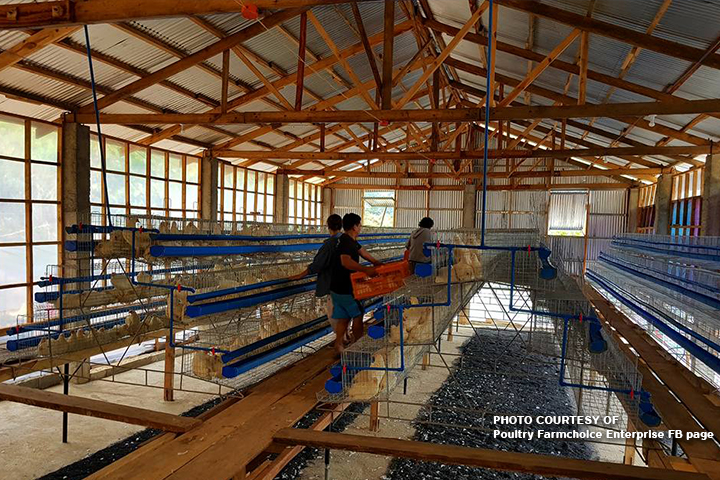Business and Economy
Poultry growers call for 40% tariff on deboned meat

In a separate statement, the Alliance of Philippine Poultry Growers (APPG) said the influx of imported poultry products, following the lifting by the government of the special safeguard duty (SSG) on these imports, has seriously affected the Philippine poultry industry. (File Photo courtesy of Poultry Farmchoice Enterprise FB Page via PNA)
MANILA — An alliance of poultry growers is urging the government to revert the 40 percent tariff on mechanically deboned meat (MDM) as mandated under the World Trade Organization (WTO) agreement which the Philippines recognizes.
The 40 percent tariff on MDM was temporarily adjusted to 5 percent in 2012 as a concession to the quantitative restriction imposed on rice importation.
This rate would revert to 40 percent by Jan. 1, 2021 as stipulated in WTO rules.
“Since we already have a rice tariff law signed by President (Rodrigo) Duterte, it is high time that the government slap 40 percent tariff on MDM,” said Rosendo So, chairman of Samahang Industriya ng Agrikultura (SINAG), in a radio interview over the weekend.
“Dapat ibalik na ang 40 percent na taripa sa MDM bilang proteksyon sa mga poultry growers natin (The 40 percent tariff for MDM should be returned as protection to our poultry growers),” he added.
The Department of Agriculture (DA), in an earlier statement, said it would still write a memorandum to the Office of the President to express the position of the agency and agriculture stakeholders on the matter.
DA Undersecretary Segfredo R. Serrano disclosed that the Tariff Commission found that reverting tariffs on MDM imports to its 2012 level of 40 percent would not have a “substantial” economic impact.
The government slashed the tariff on MDM to 5 percent as a concession to the country’s trade partners for allowing the Philippines to extend its special treatment for rice.
Serrano said the Bangko Sentral ng Pilipinas (BSP) has already factored in the 40 percent tariff on MDM in its inflation forecast.
Citing the BSP’s study, he said the government would still achieve its inflation targets even if the tariff level on MDM imports would go back to its 2012 level which is 40 percent.
“Why would agriculture have to pay just so they could get few more basis points (off) the inflation rate? There is no substantial reason to maintain (the 5 percent tariff),” Serrano said.
He said maintaining the 5-percent tariff on MDM imports would prolong the prejudice to the poultry subsector.
“It was a concession made at a cost to a sector so that (the said) sector should get relief,” he said. “The protection should be reinstated.”
In a separate statement, the Alliance of Philippine Poultry Growers (APPG) said the influx of imported poultry products, following the lifting by the government of the special safeguard duty (SSG) on these imports, has seriously affected the Philippine poultry industry.
“The importation of chicken has become deregulated and uncontrolled. This has seriously affected local poultry raisers,” APPG said.
According to the group, data shows that importation of grandparent stocks surged 106 percent between 2014 and 2018, while inbound shipments of parent stocks jumped 68 percent. Frozen chicken imports also increased 74 percent during the period.
APPG said the situation was aggravated in August 2018, when the government lifted the SSG on poultry imports, which caused intense flooding of the domestic market, without bringing down retail prices.
“The lifting by the government of the special safeguard duty on poultry imports last August was aimed at cutting retail prices and easing inflation. However, this zero-tariff measure did not significantly reduce the retail prices of chicken meat,” the group noted.
It said despite the lifting of the SSG, wet market retail prices still ranged between PHP125 and PHP160 per kilogram.
“This obviously showed that the SSG lifting had no significant effect on retail prices, the reduction of which was the original intention,” the group said.
APPG said what the SSG lifting had affected seriously the farm gate prices which at PHP38 per kilo, was way below the cost-to-produce at PHP80 to PHP85 per kilo live weight.
“This is pushing local farmers to quit raising chicken due to huge losses,” it said.
APPG said while better production conditions had caused the increase of local supply, the lifting of SSG definitely increased imports, causing intense flooding of the market.
“The government has to rethink its strategy and impose import control,” it said.
Meanwhile, the United Broilers Raisers Association (UBRA) also claimed that the lifting of the SSG on imported poultry resulted in “forgone government revenues and windfall profits for importers.”
UBRA said the lifting of the SSG also caused the collapse of farm-gate prices way below the cost-to-produce, without pulling down retail prices.
Data from the Department of Trade and Industry (DTI) show that as of November 2018, chicken leg quarter imports reached 61,434,860 kilograms (kg), eclipsing the 44,834,405 kg which were brought in the whole of 2017.
Separate data from the Bureau of Animal Industry (BAI) show that meat imports climbed 22.7 percent in 2018 to a record 850,000 metric tons (MT) which were mainly used as raw materials for meat processors.
Chicken meat imports alone climbed 18.1 percent in 2018 to 288,202.817 MT from 244,104.419 MT in 2017.
Of the total poultry imports, nearly two-thirds were MDM or raw materials for meat processors mainly to produce hotdogs, sausages and chicken nuggets.





















